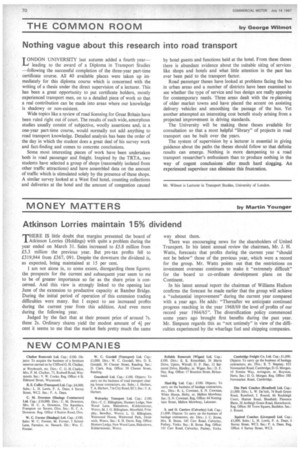Nothing vague about this research into road transport
Page 72

If you've noticed an error in this article please click here to report it so we can fix it.
LONDON UNIVERSITY last autumn added a fourth year— leading to the award of a Diploma in Transport Studies —following the successful completion of the three-year part-time certificate course. All 40 available places were taken up immediately for this diploma course which is concerned with the writing of a thesis under the direct supervision of a lecturer. This has been a great opportunity to put certificate holders, mostly experienced transport men, on to a detailed piece of work so that a real contribution can be made into areas where our knowledge is shadowy or non-existent.
Wide topics like a review of road licensing for Great Britain have been ruled right out of court. The results of such wide, amorphous studies usually consist of subjective, woolly assertions and, in a one-year part-time course, would normally not add anything to road transport knowledge. Detailed analysis has been the order of the day in which the student does a great deal of his survey work and fact-finding and comes to concrete conclusions.
Some most interesting pieces of work have been undertaken both in road passenger and freight. Inspired by the TRTA, two students have selected a group of shops (reasonably isolated from other traffic attractions) and have assembled data on the amount of traffic which is stimulated solely by the presence of these shops. A similar survey looked at a West End hotel, counting collections and deliveries at the hotel and the amount of congestion caused by hotel guests and functions held at the hotel. From these theses there is abundant evidence about the suitable siting of services like shops and hotels and what little attention in the past has ever been paid to the transport factor.
Road passenger theses have looked at problems facing the bus in urban areas and a number of districts have been examined to see whether the type of service and bus design are really apposite for contemporary needs. Three areas dealt with the re-planning of older market towns and have placed the accent on assisting delivery vehicles and smoothing the passage of the bus. Yet another attempted an interesting cost benefit study arising from a projected improvement in driving standards.
The University will be making these theses available for consultation so that a most helpful "library" of projects in road transport can be built over the years.
The system of supervision by a lecturer is essential in giving guidance about the paths the theses should follow so that definite results can emerge. Nothing is more dampening to a road transport researcher's enthusiasm than to produce nothing in the way of cogent conclusions after much hard slogging. An experienced supervisor can eliminate this frustration.
Mr. Wilmot is Lecturer in Transport Studies, University Of London.


























































































































